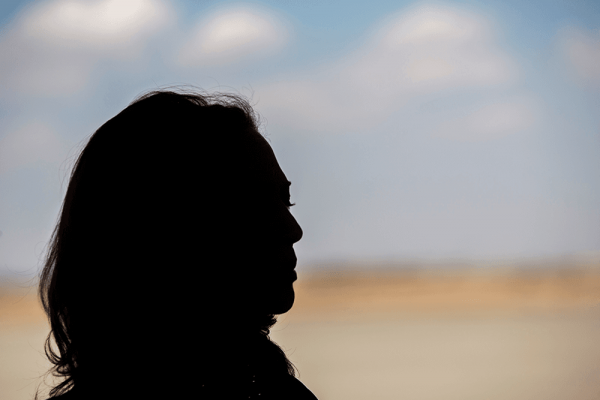The change of presumptive nominee for the Democratic Party has reinvigorated faith leaders who hope that Vice President Kamala Harris’ campaign will commit to the rights and dignity of immigrants and a secure, well-managed border.
When President Joe Biden announced he would not seek reelection and Harris became the presumptive nominee, leaders in faith and immigration said that Harris brings a new outlook to the future of their work.
Numerous faith leaders fear another Donald Trump presidency and what it might mean for migrants already living in the U.S. or arriving at its borders. But Biden’s decidedly mixed record has also garnered condemnation, with some calling his most recent executive orders — severely restricting most asylum claims at the border and expediting the removal of unauthorized migrants — “cruel and racist.”
If elected in November, Harris may continue President Biden's asylum crackdown, as her campaign chief has suggested. People of faith — and the wider U.S. population — want comprehensive immigration reform with increasing urgency. But the practicalities of bipartisan legislation have remained elusive for multiple administrations, Republican and Democrat.
This status quo at the border is one that leaders like Dylan Corbett, executive director of Hope Border Institute, an organization working to advance justice on the border in El Paso, Texas, find unacceptable and hope Harris might be able to change.
“We need a new approach to managing migration at the border, one that works for our country, for border communities, and the next generation of American immigrants looking to raise their families with dignity,” Corbett told Sojourners.
When asked what he expected from Harris on immigration in the months to come, Corbett emphasized that responsibility to reform the country’s immigration system lies with all sides.
“Both parties need to undertake a serious examination of conscience on immigration policy, which has been needlessly politicized, to the detriment of all,” he said. “Humane and safe immigration policies are possible and within reach … The only thing lacking is political leadership.”
Harris’ political history
Harris’ campaign has yet to announce an immigration policy platform. In lieu of a clear policy platform, Harris’ own leadership on the issue over the years is proving a political Rorschach test.
Already, the Trump camp has come out swinging, casting Harris as the “co-pilot” of what they believe are the Biden administration’s harmful border policies. Knowing voters will hold immigration as a key issue this November, the Trump campaign is trying to tie Harris as tightly as possible to Biden’s unpopular immigration policies.
Though she was not “Biden’s border czar” — and therefore not responsible for policy at the U.S.-Mexico border, as some Republicans and media outlets claim — Harris was called upon as vice president to address the root causes of migration to the U.S. from countries in Latin America. In that capacity, Harris announced $310 million to provide food assistance, health, education, and disaster relief services in El Salvador, Guatemala, and Honduras in 2021. Later that year, and in collaboration with then-President Alejandro Giammattei of Guatemala, Harris directed the U.S. Department of Justice to create anti-corruption and anti-human trafficking and smuggling task forces, along with millions in economic empowerment aid to Guatemala. Then, in 2023, to help deter migrants from wanting to leave their countries of origin, Harris announced $950 million in pledges from private companies to address poverty, crime, and other drivers of immigration from countries like El Salvador, Guatemala, and Honduras.
But migratory patterns shifted in the last few years, blunting the administration’s efforts at curbing migration by focusing on root causes in Central America. When Harris became vice president in 2020, nearly 90 percent of immigrants came from Mexico, El Salvador, Guatemala, and Honduras, according to the Migration Policy Institute. By the end of 2023, less-than-half of encounters at the U.S.-Mexico border were with individuals from these four countries.
Despite their hopes, faith and immigration leaders say Harris has had missteps in the role.
In her first trip abroad as vice president, Harris went to Guatemala, in an effort to better understand motivations for migration from El Salvador, Guatemala, and Honduras.
In a speech, she not only said the Biden administration wanted to help Guatemalans find “hope at home,” but made clear what would become their approach to undocumented migration.
“I want to be clear to folks in this region who are thinking about making that dangerous trek to the United States-Mexico border,” Harris said. “Do not come. Do not come.”
Those three words — “do not come” — were viewed as a blunder by many and condemned by faith leaders at the time.
240802-khimmigration2.png

Stephen Reeves, executive director of Fellowship Southwest in Dripping Springs, Texas — an ecumenical conduit of support for different ministries along the border — echoed those earlier condemnations, saying in an interview with Sojourners that Harris’ comment was problematic and disrespectful.
“Her words disregarded the gravity of the choices migrants have to make,” he said. “It’s not just a simple decision whether or not to come. It’s a decision of desperation based on experiences of violence and trauma.
“I understand why they want less people to come as an administration, but from a humanitarian perspective that’s not good enough,” he said. “And it’s not going to impact migrants’ decisions.”
At the same time, Reeves said addressing migration’s root causes — and the U.S.’s present and historical role in creating and exacerbating them — is worth the effort. The goal, he said, is for home countries to be a place where families can be safe and thrive.
But to get there, Reeves said, Harris and her administration should take the time to hear from migrants themselves. Speaking to Sojourners from the border between San Diego and Tijuana, Mexico, Reeves said, “I hope Harris would hear the voices of those who have to make those choices and, in listening to them, find solutions that create safer and more economically prosperous opportunities for people at home.
“If we can improve those things, the security at the border will improve,” Reeves said.
‘We don’t know what Harris’ ideas are going to be, but we certainly know what the Trump-Vance camp is saying.’
Corbett of Hope Border Institute agrees. Corbett said when he and other faith leaders met with Harris on her visit to El Paso in 2021, they stressed to her that the status quo — turning back asylum seekers and enforcement approaches that drive up migrant deaths — was unacceptable.
Corbett and other faith leaders also called for expanding legal pathways to citizenship for migrants already in the country and an asylum system that matches the needs of the day.
Chelsea Sobolik, director of government relations at World Relief, a Christian humanitarian group, said her organization would encourage both candidates “to prioritize a robust refugee resettlement program.”
“Seeking asylum is enshrined in both domestic and international law as a fundamental human right — a lifeline for those fleeing persecution and violence,” Sobolik said. “America’s asylum laws must function effectively and timely, to process asylum requests at the U.S.-Mexico border.”
Harris’ record before she was vice president may provide room for optimism.
In 2015, when Harris was California’s attorney general, she told CBS Los Angeles that “an undocumented immigrant is not a criminal.” And starting in 2017 as a U.S. Senator, Harris was a strong advocate in favor of expanding work and legal pathways for Dreamers, people brought to the United States unlawfully as children. Not only was Harris a vocal part of a Senate hearing on the Trump administration’s highly controversial separation policy, in which more than 5,000 undocumented migrant children were separated from their parents at the U.S.-Mexico border, but in 2019, she and several other Democratic senators reintroduced the Reunite Every Unaccompanied Newborn Infant, Toddler and Other Children Expeditiously (REUNITE) Act, hoping “to expedite the reunification of separated immigrant families and promote humane alternatives for asylum-seeking immigrant families.”
As a presidential candidate in 2019, she proposed an immigration plan calling for a path to citizenship for recipients of Deferred Action on Childhood Arrivals program, best known as DACA.
But when she was San Francisco’s district attorney, Harris supported a citywide policy that handed juvenile migrants suspected of committing felonies over to federal immigration authorities. Though she later stepped back her support for the program, stating that she wished the “policy could have been applied more fairly,” her words may yet be used against her by Republicans who link a perceived increase in crime with rising immigrant encounters at the U.S.-Mexico border.
However mixed Harris’ record might or might not be, Southwest Fellowship’s Reeves said it is clear where her opposition stands.
“We don’t know what Harris’ ideas are going to be, but we certainly know what the Trump-Vance camp is saying,” he said. “And we are terribly concerned about a Trump administration, where mass deportations and severely limiting changes in the asylum-seeking process are likely.”
Like Reeves, Global Refuge’s president and CEO Krish O’Mara Vignarajah does not want to get ahead of herself. But she hopes a Harris presidency would signal a shift in the right direction for migrants, refugees, and asylum seekers in, or coming to, the U.S.
Citing Harris’ record, background as an attorney, and representation of a border state (California), Vignarajah believes Harris is both well equipped for the complicated task at hand and better “poised to bring more order, fairness, and efficiency to complex migration challenges at the southern border,” she said.
Aside from policy and positions, Vignarajah also pointed to a further, perhaps non-tangible factor in Harris’ favor. As the daughter of immigrants, raised with influences from India and Jamaica, as well as her parents’ Hindu and Baptist traditions, Harris is the face of second-generation Americans, a growing political and cultural force in U.S. politics and policy.
“Her presumptive nomination also sends a powerful message in terms of representation — not just to young girls, but also to hard working immigrant parents across the country who may never have imagined that their family could be one generation removed from the Oval Office,” said Vignarajah.
Got something to say about what you're reading? We value your feedback!






